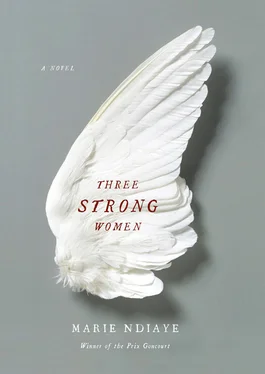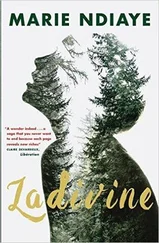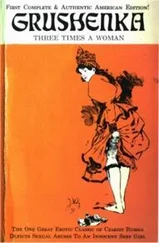She was aware of it, she understood and accepted it: the mortification he was feeling, which left him with that blank look and made him seem remote, so different from the intense, friendly boy he had been.
Understanding it, she didn’t hold it against him.
What she didn’t then know, what would only gradually become clear but what at the time she was unequipped to envision, was that the boy was doubly humiliated, both by what had happened the day before and, as a matter of deduction, by something that hadn’t yet happened, something that Khady, who, though not naive, was too inexperienced to have yet intuited but that he, Lamine, knew would happen: that was why — Khady would later understand — he’d felt so ashamed in her presence, ashamed both at knowing she didn’t know and ashamed at the thing itself: that was why, out of fear and unwillingness to have anything to do with Khady’s innocence, he was so withdrawn from her.
Had he, later on, said anything specific to her?
She couldn’t remember exactly.
But it seemed to her that he hadn’t.
They’d simply wandered around, each limping in a different fashion (he trying to step only on the outer edges of his feet, she hopping along with irregular steps, trying to favor her sore leg), through streets heavy with dry, dusty heat under a yellowish, shimmering, sand-colored sky.
Lamine’s close-cropped hair, face, and chapped lips were still covered with sand.
Dazed and desperate to find some shade, they’d sought out a cheap place to eat, with earthen walls and no windows, where, in the semidarkness, they’d eaten tough, stringy pieces of grilled goat’s meat and drunk Coke, both knowing that they’d no money left to pay even for this meager fare, and Lamine retreated into a bitter, heartrending detachment behind which — he perhaps thought — he could take refuge alone with his indignity without it contaminating Khady, he who knew what was going to happen while she — he perhaps believed — still did not. But she’d had an inkling when, chewing the last piece of meat and washing it down with a last gulp of Coke, her eyes had met the hostile, half-closed eyes of the woman who had served them and who, breathing noisily, slumped on a chair in the darkest corner, had been scrutinizing the two of them, her and the boy. Khady had wondered then how they were now going to pay what they owed. In a way the woman’s unfriendly, judgmental, inquisitive gaze had given her the answer.
Throughout this period she would cling ferociously to the conviction that only the reality of physical pain had to be taken into account.
Because her body was in a permanent state of suffering.
The woman made her work in a tiny room that gave onto a courtyard at the back of the chophouse.
There was a foam mattress on the hard floor.
Khady spent most of her time lying on it, dressed in a beige slip. The woman would bring a customer in, usually a wretched-looking young man who, like Khady and Lamine, had fetched up in this town, where he scraped together a living as a houseboy, and who often on entering the hot stuffy room would cast frightened looks around him as if caught in a trap of what was hardly — Khady thought — his own desires but the machinations of the woman who tried to inveigle every diner into visiting the room at the back.
The woman would then lock the door and go away.
The man would then lower his trousers with almost anxious haste, as if it were a matter of getting a tiresome and vaguely threatening obligation over with as quickly as possible. He’d lie down on Khady, who — to avoid jolting it as best she could — would move aside her injured leg, on which the woman put a fresh bandage each day. He would then enter her, often groaning in surprise, because a recent attack of pruritus that made Khady’s vagina dry and inflamed also caused his penis some discomfort. She summoned all her mental strength to counter the multiple shooting pains in her back, her lower abdomen, and her calf, thinking, There’s a time when it stops, feeling on her chest half hidden by the lace edging of her slip and on her neck the man’s copious sweat mingling with hers, thinking again, There’s a time when it stops, until the man finished his labors and, in a murmur of pain and disappointment, promptly withdrew.
He would then bang on the door and they would both hear the slow, heavy tread of the woman coming to open it.
Some customers would complain, saying that it had hurt, that the girl was infected.
And Khady thought with surprise, Ah, “the girl,” that’s me, almost amused to be the one referred to that way, she, Khady Demba, in all her singularity.
She would remain lying there a while after the other two had gone.
Breathing slowly, with her eyes wide open, she would calmly inspect the cracks in the pinkish walls, the corrugated-iron ceiling, and the white plastic chair under which she’d put her bundle.
Lying perfectly still, she could hear the blood throbbing calmly, softly, in her ears, and if she moved slightly, the sucking sound of her wet back on the mattress — which was also soaked in sweat — and the tiny lapping noise made by her burning vulva, and then, feeling the pain oozing gently away, overcome by the youthful, tempestuous vigor of her solid, willful physique, she would think, calmly, almost serenely, There’s a time when it stops, so calmly, so serenely, that when the woman came back not alone, as she usually did, to wash her, nurse her, and give her something to drink, but in the company of another customer whom — with a vague gesture of regret or excuse in Khady’s direction — she would bring in: even then Khady would experience only a brief moment of dejection, weakness, and disorientation, before once more thinking calmly, There’s a time when it stops.
After imposing one customer after another upon her, the woman would take care of Khady with motherly solicitude.
She’d bring a towel and a bucket filled with cool water and gently wash Khady’s nether regions.
In the evening they would sit down together in the courtyard and Khady would eat a solid meal of goat’s meat and boiled corn washed down with Coke, keeping back a portion for Lamine.
The woman would take off Khady’s bandage, smear fat on the wound, which was swollen and foul smelling, and bind it up again with a clean piece of cloth.
And as they sat there, full up, enjoying the quiet of the cool evening, Khady would turn to look at the woman. In the dusk she could see only the outline of a round, kindly face, and it sometimes seemed to her that she’d gone back to the time of her childhood, which, although harsh, muddled, and often grim, had had its happier moments, such as when Khady sat in front of the house at her grandmother’s feet to have her hair done.
Just before nightfall, Lamine would arrive.
He slipped into the courtyard — Khady thought with a touch of pity and disgust — like a dog afraid of getting a hiding, but even more of finding his bowl empty. Lamine was at once quick and stooping, keen and furtive. Khady and the woman pretended not to notice, Khady out of delicacy and the woman out of scorn, and Lamine would pick up the full plate and carry it to Khady’s room, where the woman allowed him — or at least didn’t forbid him — to spend the night, on the unspoken proviso that he’d be gone by dawn.
Before going to bed, the woman would give Khady a small part of the money she’d earned.
Khady would also turn in, going back to the pinkish room lit by a grimy bulb hanging from the tin roof.
Seeing Lamine, once so energetic, crouched in a corner scraping his plate with his spoon, made Khady feel her aches and pains all come flooding back.
Because what — beyond the faintly tired evidence of her own honor now forever secured, and the rather weary awareness of her irrevocable dignity — could she set against the incurable shame the boy felt?
Читать дальше












